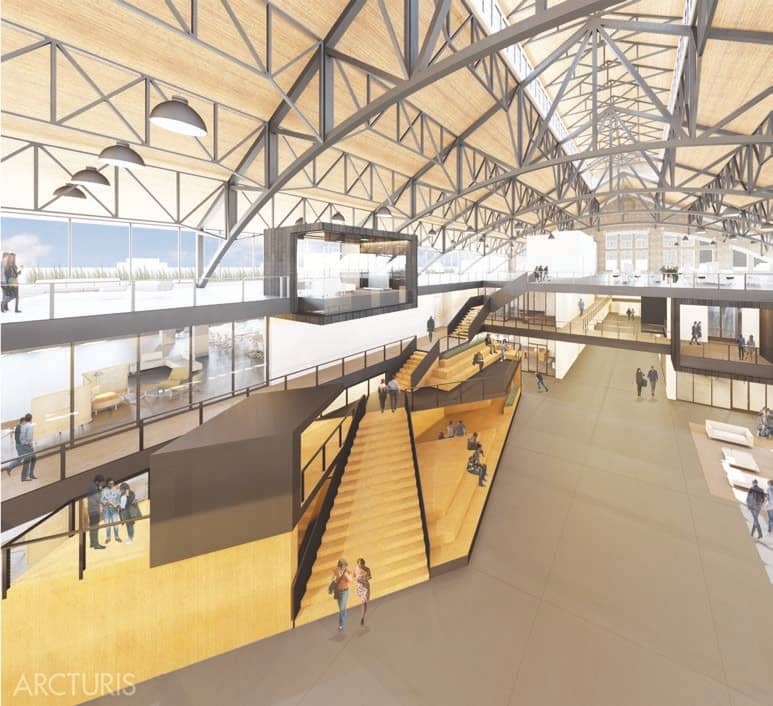يحاول ذهب - حر
Reconnecting St. Louis
March/April 2019
|DesignSTL
Green Street, in redeveloping the Armory, aims to link St. Louis’ past with its future.

IT’S FITTING, IN light of the building’s significant role in the city’s history, that the St. Louis Armory would become part of the blueprint for its future. Built in 1938 for the 138th Infantry Regiment of the Missouri National Guard, the structure is impressive in both architecture and history. It’s played host to not just military drills but also musical acts, and is credited with helping some of the greats of tennis—among them Arthur Ashe, Jimmy Connors, and Butch Buchholz—develop their game.
This once-vibrant tennis hub, music venue, and military facility for years sat vacant and dilapidated. But now it’s getting a new lease on life thanks, in part, to the work of one passionate tennis player and an experienced developer.
Rick Randall, who grew up playing tennis at the Armory, remembers the polished floorboards and the effect they had on a player’s game. “The wood was very slick, so when the ball hit it, it bounced extremely fast,” he says. “It produced a type of player who had great return of serve and a shorter, more concise stroke.”

هذه القصة من طبعة March/April 2019 من DesignSTL.
اشترك في Magzter GOLD للوصول إلى آلاف القصص المتميزة المنسقة، وأكثر من 9000 مجلة وصحيفة.
هل أنت مشترك بالفعل؟ تسجيل الدخول
المزيد من القصص من DesignSTL

DesignSTL
Cut from the Same Cloth
“Turkey Tracks” is a 19th-century quiltmaking pattern that has the appearance of little wandering feet. Patterns like the tracks, and their traditions and myths, have been passed down through the generations, from their frontier beginnings to today, where a generation of makers has embraced the material as a means of creating something new. Olivia Jondle is one such designer. Here, she’s taken an early turkey track-pattern quilt, cut it into various shapes, and stitched the pieces together, adding calico and other fabric remnants as needed. The result is a trench coat she calls the Pale Calico Coat. Her designs are for sale at The Rusty Bolt, Jondle’s small-batch fashion company based in St. Louis. —SAMANTHA STEVENSON
3 mins
January/February 2021

DesignSTL
Color Block
A background in sculpture trained artist Aly Ytterberg to see objects more fully.
3 mins
January/February 2021

DesignSTL
A Modern Story
How a little log cabin went from being a home to a guest house
3 mins
January/February 2021

DesignSTL
IN GOOD TIME
With the help of interior designer Robert Idol, a Kirkwood couple creates a home that pays homage to the past, yet feels just right for their modern young family.
5 mins
January/February 2021

DesignSTL
Let's Dish
"Food Raconteur” Ashok Nageshwaran wants to tell you a story.
2 mins
January/February 2021

DesignSTL
The Right Move
New shops and showrooms bring exciting opportunities for local designers, makers, and arts organizations to sell their wares to home enthusiasts here and everywhere.
2 mins
January/February 2021

DesignSTL
Green Dreams
Painter and gardener Lauren Knight branches out.
3 mins
January/February 2021

DesignSTL
Cultivating Kokedama
Chris Mower of White Stable Farms discovered the Japanese style of gardening in Italy. Now, he’s bringing it to St. Louis.
2 mins
January/February 2021

DesignSTL
Graphic Mood
Letters, icons, and illustrations that speak in a hand-drawn language
2 mins
January/February 2021

DesignSTL
AUDRA's New Digs
Audra Noyes, of the Saint Louis Fashion Fund Incubator’s first class, opens an atelier in Ladue.
2 mins
January/February 2021
Translate
Change font size
